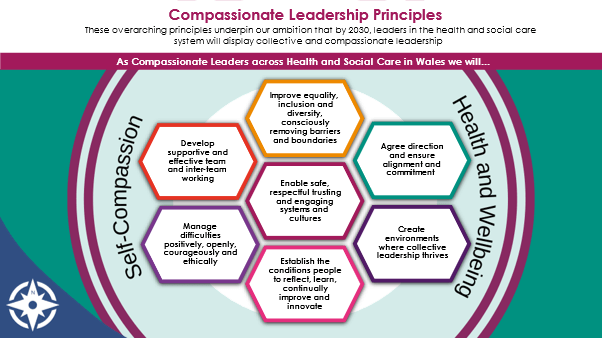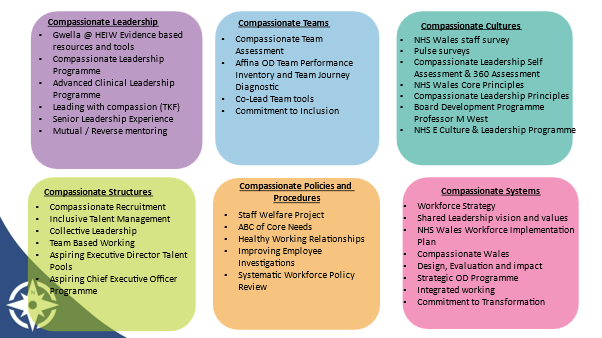Wales or ‘Cymru’ in the Welsh language, is one of the constituent countries of the United Kingdom. It has a population of just over three million living in a total area of 21,218 km2 and over 2,700 km of coastline. It is a beautiful country with areas of wilderness, mountains and lakes and with a rich cultural identify. It was originally populated by Celts and was conquered by England in 1283. It has its own parliament (the Senedd) which enables a governing system of devolved policy making, including responsibility for the running of the National Health Service (NHS Wales).
Background
As in many countries the NHS in Wales faces many pressures including:
- Vacancies in health and social care and global competition for staff
- Unsustainably high levels of staff stress
- Reducing intention to quit and ensuring high levels of retention of staff
- High levels of demands on services exacerbated by health care complexity, an ageing population and inequalities in health and wellbeing
- A need to transform models and systems of promoting the health of the population through using evidence-based practice, working across boundaries with all the agencies and the whole population to develop preventative approaches to ensuring the health and wellbeing of the population.
Health Education and Improvement Wales (HEIW) is the strategic workforce body for NHS Wales. It has the responsibility to ensure Wales is a great place to train and work for health and care staff and maximising the contribution of all professions and occupations.
HEIW’s vision is “to develop a skilled and sustainable workforce that improves care and population health”. Over 100,000 people work in the NHS in Wales and are pivotal to building a sustainable health and care system that meets the needs of the population.
The approach
HEIW has three strategic aims, including a commitment to develop compassionate leadership and cultures:
-
Building Future Workforce: Developing and implementing plans that align future workforce demand with supply.
-
Developing the Current Workforce: Transforming today’s workforce to contribute to new models of care which improve quality and safety.
-
Culture and leadership in NHS Wales: Embedding compassionate leadership principles to develop cultures that support inclusion, wellbeing and quality.
And eleven objectives
- Invest in domestic education and training supply to respond to health and care needs.
- Transform multi-disciplinary education and training to meet future needs.
- Develop, publish, and implement strategic workforce plans in priority areas.
- Improving attraction and recruitment to education, training & employment.
- Develop workforce solutions for National NHS Programmes & Priorities.
- Design and develop resources to support workforce and service transformation.
- Target development of skills & capabilities to support transformation and future proof current staff.
- Scale and spread compassionate and collective leadership opportunities for leaders at all levels across NHS Wales.
- Create diverse and multi-professional pipelines of aspiring leaders for NHS Wales.
- Influence cultures that promote retention, staff wellbeing, improved engagement and effective teamworking within NHS Wales.
- Ensure equality, diversity & inclusion is embedded in all that they deliver.
HEIW has committed to ensuring that by 2030, all leaders in the health and social care system will display collective and compassionate leadership. Underpinning this ambition is a leadership compass that provides a direction setting guide for leaders to ensure a successful journey towards embodying compassionate leadership:

To further guide leaders and provide detailed content for the compassionate leadership and cultures strategy, HEIW undertook system wide consultation to develop a set of underpinning compassionate leadership principles.

A comprehensive, integrated approach to developing compassionate cultures
To write compassion into the genetic structure of the health and social care system, HEIW has strategies, practices and policies that extend across six key areas: compassionate leadership, compassionate teams, compassionate cultures, compassionate structures, compassionate policies and procedures and compassionate systems. This has included board development sessions with the senior leaders in every organization across the health system and repeated presentations to staff all across the nation’s health and care system.

Web-based portal
HEIW have developed a web site to support the work with a highly sophisticated and rich leadership portal on a website called Gwella (Welsh for ‘Improvement’) . This multi-award winning portal has hosted hundreds of networks, educational programmes, conferences and masterclasses and provides a rich range of resources for health and social care staff.
Compassionate leadership pledge
Both staff and organisations that constitute health and social care services in Wales are invited to commit to a compassionate leadership pledge. ‘Achieving compassionate cultures is everyone’s business and responsibility so we must all be compassionate and collective leaders. Collective and compassionate cultures are created through compassionate leadership which involves a focus on relationships through careful listening to, understanding, empathising with and supporting other people, enabling those we lead to feel valued, respected and cared for, so they can reach their full potential and do their best work’.
The Compassionate Leadership Pledge commits organisations and individuals to creating compassionate and inclusive NHS Wales workplaces by embedding each of the Compassionate Leadership Principles. Those signing commit to: develop and model compassionate leadership and Create compassionate and collective cultures within their teams and organisations by embedding the Compassionate Leadership Principles for health and social care in Wales. The pledge is commitment-based and is reviewed every 2 years.
You or your organization can sign up to the pledge here.
The impact on health outcomes
Data collection from the health and care systems across the UK (drawing on the largest continuous annual staff survey globally) shows that when compassionate leadership and cultures are missing there are much higher levels of staff sickness absence, turnover and stress. This damages staff health and wellbeing, quality of care, productivity and patient outcomes. The data show that compassionate leadership is associated with higher levels of staff engagement, patient satisfaction, staff retention, care quality, efficient use of resources and lower levels of avoidable patient mortality. The evidence for these outcomes can be found on the NHS Employers site, on the NHS England site, and in this article by Thomas West and this book by Michael West.
The impact on those providing care
Where staff generally report lower levels of compassionate leadership in health and social care, staff report higher levels of stress and work overload, patients are less likely to report being treated with compassion, care and respect; care quality and use of resources are significantly work; staff retention is lower and avoidable patient mortality is much higher.
Key learning points
The inspiring and powerful work in Wales is a result of many people having the courage to commit to a strong, positive vision for a compassionate future and the courage to pursue it. It has required strong, courageous and compassionate leadership from the leaders of HEIW to formal and informal leaders across the nation’s health and care system.
The strategy has involved wide consultation and engagement of staff, patients, communities and families. It has also required courageous consultation with senior leaders, politicians, civil servants, staff working at the sharp end of organisations, trade unions and media outlets to engage and win the support of all those who can influence the transformation.
Particularly significant is that the approach is comprehensive spanning all areas of activity (culture, leadership, people management processes, teamworking, recruitment) rather than focusing on just one area of the system. This courageous, coherent, integrated, wide-ranging comprehensive approach aims to rewrite the genetic structure of an entire national health and care system.
It is a sustained approach, initially committing to a ten-year strategy to ensure compassionate leadership across all of health and social care. Sustaining the strategy has required courage from senior leaders, who might otherwise be blown off course by the demands (for example) of political leaders for a short-term focus on other areas or the temptation to be deflected by the latest initiative or attractive idea.
Finally, the evidence-base for the approach has been key to ensuring its spread and acceptability in a system focused on using research to underpin approaches to promoting the health and wellbeing of the nation.
